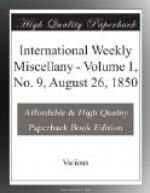Will Russian arms prevail in the end? The following is Herr Bodenstedt’s answer; after noticing the arrival of Woronzow, and the expectations raised by his talents, by the immense resources at his command, as well as by such events as the storm of Schamyl’s stronghold of Cargo:—
“He who believes that the issue of this contest hangs on the destruction of stone fortresses, on the devastation of tracts of forest, has not yet conceived the essential nature of the war in the Caucasus. This is not merely a war of men against men—it is a strife between the mountain and the steppe. The population of the Caucasus may be changed; the air of liberty wafted from its heights will ever remain the same. Invigorated by this atmosphere, even Russian hirelings would grow into men eager for freedom: and among their descendants a new race of heroes would arise, to point their weapons against that servile constitution, to extend which their fathers had once fought, as blind, unquestioning slaves.”
To this answer of Herr Bodenstedt’s we will add nothing of our own. We are weary with waiting for the events of history such as we would have them.
* * * * *
COOLING A BURNING SPIRIT.
An incident which occurred soon after the accession of the present Sultan, shows that, in some respects, at least, he is not indisposed to follow up the strong traditions of his race. At the beginning of his reign, the Ulema was resolved, if possible, to prevent the new Sultan from carrying on those reforms which had ever been so distasteful to the Turks, grating at once against their religious associations and their pride of race, and which recent events had certainly proved not to be productive of those good results anticipated by Sultan Mamoud. To attain this object, the Muftis adopted the expedient of working on the religious fears of the youthful prince. One day as he was praying, according to his custom, at his father’s tomb, he heard a voice from beneath reiterating, in a stifled tone, the words, “I burn.” The next time that he prayed there the same words assailed his ears. “I burn” was repeated again and again, and no word beside. He applied to the chief of the Imams to know what this prodigy might mean; and was informed in reply, that his father, though a great man, had also been, unfortunately, a great reformer, and that as such it was too much to be feared that he had a terrible penance to undergo in the other world. The Sultan sent for his brother-in-law to pray at the same place, and afterward several others of his household; and on each occasion the same portentous words were heard. One day he announced his intention of going in state to his father’s tomb, and was attended thither by a splendid retinue, including the chief doctors of the Mahometan law. Again, during his devotions, were heard the words, “I burn,” and all except the Sultan trembled. Rising from his prayer-carpet,




